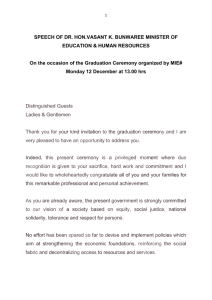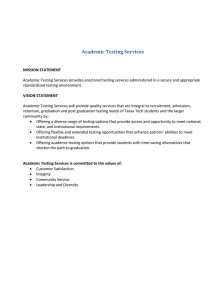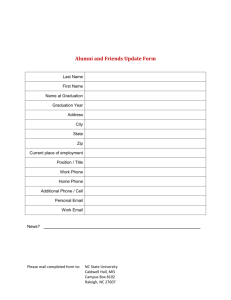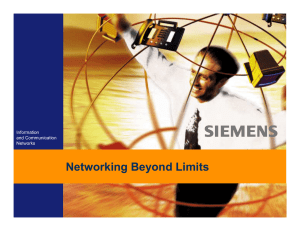Graduation Ceremony 3 Wednesday 19th November 2014 at 4.30 p.m.
advertisement
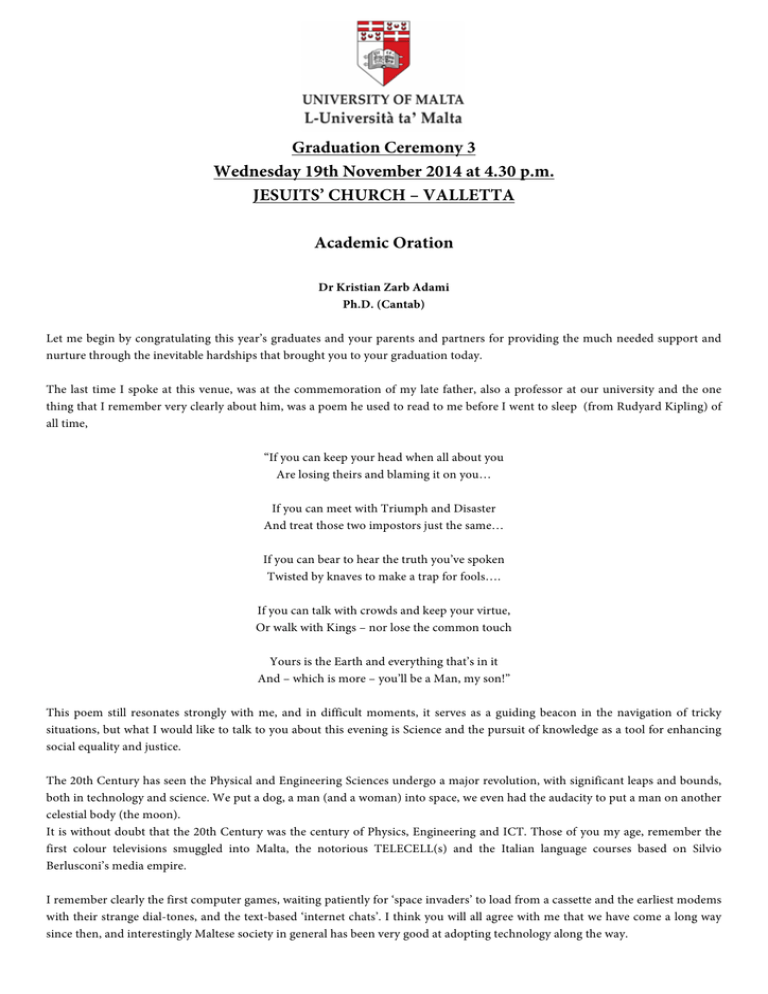
Graduation Ceremony 3 Wednesday 19th November 2014 at 4.30 p.m. JESUITS’ CHURCH – VALLETTA Academic Oration Dr Kristian Zarb Adami Ph.D. (Cantab) Let me begin by congratulating this year’s graduates and your parents and partners for providing the much needed support and nurture through the inevitable hardships that brought you to your graduation today. The last time I spoke at this venue, was at the commemoration of my late father, also a professor at our university and the one thing that I remember very clearly about him, was a poem he used to read to me before I went to sleep (from Rudyard Kipling) of all time, “If you can keep your head when all about you Are losing theirs and blaming it on you… If you can meet with Triumph and Disaster And treat those two impostors just the same… If you can bear to hear the truth you’ve spoken Twisted by knaves to make a trap for fools…. If you can talk with crowds and keep your virtue, Or walk with Kings – nor lose the common touch Yours is the Earth and everything that’s in it And – which is more – you’ll be a Man, my son!” This poem still resonates strongly with me, and in difficult moments, it serves as a guiding beacon in the navigation of tricky situations, but what I would like to talk to you about this evening is Science and the pursuit of knowledge as a tool for enhancing social equality and justice. The 20th Century has seen the Physical and Engineering Sciences undergo a major revolution, with significant leaps and bounds, both in technology and science. We put a dog, a man (and a woman) into space, we even had the audacity to put a man on another celestial body (the moon). It is without doubt that the 20th Century was the century of Physics, Engineering and ICT. Those of you my age, remember the first colour televisions smuggled into Malta, the notorious TELECELL(s) and the Italian language courses based on Silvio Berlusconi’s media empire. I remember clearly the first computer games, waiting patiently for ‘space invaders’ to load from a cassette and the earliest modems with their strange dial-tones, and the text-based ‘internet chats’. I think you will all agree with me that we have come a long way since then, and interestingly Maltese society in general has been very good at adopting technology along the way. In fact the knowledge explosion has meant that today, society has much more access to information, and this is what I mean, when I say that the pursuit of knowledge does indeed enhance social equality and justice. Today, there is very little excuse for people to claim ignorance and I can testify to this as a lecturer, it is particularly annoying when an enthusiastic undergraduate is sitting in your lecture sieving your lecture content through Wikipedia. However, ‘with great knowledge comes great responsibility’ and it is becoming more difficult to separate the wheat from the chaff when we are bombarded with all this information content. Scientists use it to support their arguments, politicians use it to influence the masses, and it is left up to the individual to cast an analytical eye. And this is hopefully, one of the things you learnt in your research and throughout your postgraduate courses. But enough, about the past and the present, let’s turn our focus to the future, both of Science and Society and here I’m going to go out on a limb, but since I don’t intend to be here in a 100 years’ time the only evidence of my folly will be in a graduation booklet. If the 20th Century belonged to Physics and Engineering, the 21st Century will be dominated by genetics and a vast improvement will be seen in biotechnology sector. My prediction is that over the next 75 years, every organ (with the possible exception of the brain) will be transplantable, and the average life of a human being will surpass one hundred. Whilst this in itself is an amazing achievement, it will place a huge burden on our planet’s resources and social responsibility and equality will take on a whole new meaning. Birth rates will inevitably drop, diseases cured and genetic mutations harnessed. The longevity of life will also change the way we think and behave. Our species as a whole will evolve to these longer timescales. University degrees may even become 20 years long!! I believe that Energy (to the home) and communications will become free and will no longer continue to be a scarce resource. Travel will become even cheaper with every place on earth being as accessible as the next. Instead, water and food will become the oil and gas of today. Genetically modified crops will become staple foods and the distribution of water and food will continue to play an important part of society as it has done for the past centuries. Bio-Technology and technology in general will continue to enjoy the exponential growth that we have seen over the past years. Much as we think that technology is pervasive today, in the future, I believe that Artificial Intelligence will surpass human intelligence (I read somewhere that the prediction is approximately 2045) and this will pose new problems both ethically and socially. It is hard to fathom a scenario where we have designed humans better than ourselves, but when you think about it, it’s exactly what we have been doing with genetic modification and medical drug discovery over the past centuries. But it’s certainly all not doom and gloom, I, for one am certainly looking forward to 15-hour weeks when my robot collaborator is supervising my robot students for me (although I might be the human slave by then – who knows?). Driverless cars will certainly be a welcome break for the murderous traffic I encountered on my way here. People will also become much more aware of their health, with health products and monitoring systems becoming commoditized. This is already happening with portable ultrasound systems as well as contact lenses which monitor glucose for diabetics. All of science will become one and will (as it has done) work for an improved quality of life. With the longevity of life and the improvement of our biological systems, space travel will become feasible and the inhabitation of other planets will become possible. Space technology will improve such that we will be able to precisely control our planet’s position around the sun. And the wonderful thing about the future is that it hasn’t happened yet. And though some might say that the trajectories have been set and momentum so great, it is unstoppable, I am firmly of the opposite opinion. The future is yours to hold and to direct. As prior generations have done, you sit between a past inherited from your ancestors and a future you will bequeath to your successors. So I’d like to close with some words of advice, that were given to me a long time ago, and like with all good advice, the only thing to do is to pass it on: • “Think, analyse and criticise, do not take facts at face value, and remember that everyone has an agenda (hidden or not). Weigh the opportunities versus the consequences, read around the subject and draw your own conclusions. Form opinions, defend them staunchly, but yet be willing to change.” • “Open your mind, broaden your horizons and above all travel! See the world, meet new cultures and make new friends. Be true to yourself, stand for your principles, but be flexible and malleable to those of others. • “Stand for something or you will fall for anything.” • “Teach!! Teach the world a little of what you have learned, share your experiences and pass on your knowledge, yet don’t take offence if it is neither heeded nor followed.” • “Inspire!! Inspire both the younger and especially the older generations to continue to grow and maximise their potential. Show them the possibilities, educate them in the understanding of others and the behaviour befitting graduates of our university.” • “Lead!! Lead by example to younger and older people alike. Be the person you want others to be!!” But above all, I want to leave you with words borrowed from another of my favourite poems: “What is this life, if full of care, We have no time to stop and stare. No time to turn at Beauty’s glance, And watch her feet, how they dance, A poor life this, if full of care, We have no time to stop and stare.” Congratulations, thank you and good evening.
